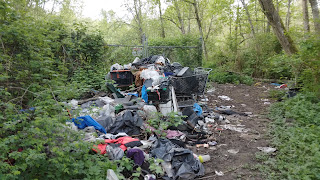Last December I wrote about the demise of the Longacres horse race track in Renton (1). But that is hardly the only significant disappearing act in the area. Take for instance this scene:
Well, so what you say, it is just more new (as yet unoccupied) warehouses in Kent. It is one of about a dozen such warehouses (including the Amazon fulfillment center) built on one particularly large plot of land that was once owned by one company:
What's left of it can be seen peaking through the new warehouses here...
...and here:
Yes, that is, or was, the great Boeing Space Center, of which the current satellite and google map imagery is a bit out of date, because where you see all those parked cars here...
...and eventually more like this today:
Frankly, I never thought I'd get this close a look at the "famous" Number 12 building:
But then nothing is exactly sacred when it is just taking up space like this office building was...
...which used to look something like this (the "Pink Palace"):
How the mighty have fallen. The Boeing Space Center in Kent, which was most famous for its part in the development of the Lunar Rover...
...once employed 5,500 people before Boeing's space-based contracts for the site dried-up and as few as 500 were employed. Supposedly there were plans to relocate employees from other locations to fill its empty spaces before the pandemic, but the traffic that one sees going in and out is a tiny fraction of what it once was just a few years ago.
So much for the high end of the scale. What about the low end of the scale? There was a story in the Seattle Times yesterday about another major clean-up of a homeless encampment in a city park that local residents were expressing resentment over. Homelessness in the wake of the pandemic has become notorious in the city and the county in general, and it isn't helped by the fact that "gentrification" has basically worked out better for "yuppie" types and H-1B visa workers than low or middle income people looking for affordable housing. In Kent there are four new yuppie-ready apartment buildings built within a 10 block radius, within throwing distance of residential areas filled with barely hanging together houses and converted motels that are just waiting for the city to condemn them to build more Yuppievilles.
So what to do if you can't afford a place to live and become one of the homeless? I have to admit that some of these people are as resourceful as they are brazen. Take for example these people, who apparently make their living as "scavengers"--in which terms like "finding" and "stealing" are probably interchangeable:
I suspected that these people had just relocated their "business" after police had evicted them from a prior location (and probably more than one). I told them that they were asking for trouble being out in the open like that, when the local police might hand out trespassing citations for just sitting there. Their response was to yell vulgar epithets and threats; well, I warned them.
Eventually they were informed by a city public works clean-up crew to clear out or it would be cleared out for them. So what did they do next? A hundred yards down the trail was a fenced-in wetlands area. What the hell, these fools cut a hole in the fence that was in plain sight...
...and erected these tents, also in plain sight of the "authorities":
These folks kept hauling in more and more "stuff" in there. Here is what people like this tend to leave behind them when they do decide to, or are forced to, move on:
One day a clean-up crew from the public works department covered up the hole in the fence; but what were they expecting these scavengers to do? Hell, cut a new, bigger hole just a few yards further down:
These are the kind of people who attract unwanted attention; I couldn't believe how brazen they were about this, given that they should have known from previous encounters that the trail was periodically "cleaned-up" and so would they. Maybe they thought they would be left alone here, but I knew better. I noticed that every weekday there were city people driving trucks up and down the trail to see what was going on, although the police were apparently not part of the daily patrol. Then one day it was decided enough was enough and a crew was sent in to "clean up." I have to admit I was surprised by how much "stuff" they found back there collected in just a few months time:
So there is the rise and fall of a homeless camp that only lasted as long as it did because it was far from any urban settlements for people to complain about, but still destined to fall because the trail was a public accommodation that was periodically visited by clean-up crews looking for obvious garbage. Here is a map that shows the amount of garbage being gathered from mostly homeless encampments (about 65 tons of it) in just the Kent area alone, and that barely half of the service requests for such clean-ups have been completed. The pile of garbage four images ago was there for years until the public works department was reminded of its existence.
Of course there is a partial "fix" to problems like this: affordable housing for the low-income.













.jpg)






No comments:
Post a Comment